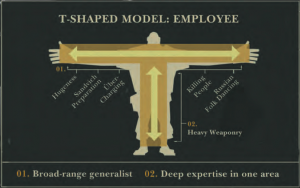The Quality That Top Game Development Companies Look for in Employees
— December 29, 2014In the competitive world of technology and gaming, standing out requires more than just technical expertise. One of the most notable companies in the industry, responsible for acclaimed titles such as Half-Life, Portal, and Left 4 Dead, exemplifies this through its hiring philosophy. This company not only revolutionized the gaming industry but also transformed how digital distribution works with its highly successful platform, Steam.
While this company is private and does not share financial details, insights from a 2011 Fortune profile reveal its immense success. Founder Gabe Newell highlighted that the company was “tremendously profitable,” with revenues estimated in the hundreds of millions of dollars. Remarkably, Newell claimed the company outperformed giants like Apple and Google in profitability per employee. The secret to this success lies in its workforce, selected with a unique approach designed to maintain excellence across every project.
The company’s hiring strategy is anchored in its flat organizational structure, as detailed in its now-famous employee handbook. In such a structure, every addition to the team is pivotal. The handbook emphasizes that bringing in the right person creates value throughout the company, while missing out on exceptional talent is one of the costliest mistakes the organization can make. This perspective reflects the importance of individual contributions in non-hierarchical companies.
The Concept of the T-Shaped Employee
A defining aspect of the company’s hiring process is its focus on what it calls “T-shaped” employees. This metaphor captures the dual qualities that ideal candidates should possess: broad skills and deep expertise. The top of the “T” represents generalist abilities—skills across various domains that allow an individual to adapt to diverse tasks and collaborate effectively. The vertical leg symbolizes specialized knowledge, signifying mastery in a particular area.

The handbook clearly outlines why this combination is essential. Employees lacking depth struggle to make meaningful contributions, often relegated to the margins of the organization. On the other hand, specialists without breadth find it challenging to work cohesively in a collaborative environment. A T-shaped employee bridges these gaps, excelling as both an individual contributor and a team player.
This philosophy extends beyond game development and has become increasingly relevant for other industries, such as web and mobile application development. Companies seek this balance when hiring. Employees who bring a mix of generalist skills and niche expertise often fit better into dynamic teams and adapt more seamlessly to global assignments.
Why T-Shaped Employees Thrive
The concept of T-shaped employees resonates because it aligns with how modern businesses operate. Collaboration is vital, particularly in industries where cross-functional teams are the norm. Game development, for instance, involves diverse roles, from programming and design to storytelling and sound engineering. Each team member contributes their specialized skills while relying on others to fill gaps in knowledge.
A T-shaped employee thrives in such environments because they can engage in meaningful collaboration while bringing unique strengths to the table. For example, an artist with a strong understanding of programming concepts can communicate more effectively with engineers, enhancing the overall workflow. Similarly, a developer with a flair for storytelling may bring fresh perspectives to narrative-driven projects.
Moreover, the breadth of skills often fosters creativity. Individuals with diverse interests tend to approach problems differently, exploring solutions outside their primary field of expertise. This versatility becomes a valuable asset, especially in creative industries like gaming.
Cultural Fit and Adaptability
Beyond technical skills, the company also values cultural fit—a quality that ensures employees thrive in its non-hierarchical structure. In a flat organization, individuals must navigate responsibilities independently, often without a manager’s direct oversight. This autonomy demands a proactive attitude, effective communication, and a strong sense of accountability.
Vietnam software outsourcing companies echo similar sentiments when recruiting for web and mobile development roles. Cultural fit is particularly important when employees work onsite overseas. A team member who adapts quickly to new environments and collaborates effectively with diverse teams can significantly impact project outcomes.
Recruitment Tips for Aspiring T-Shaped Employees
To increase your chances of joining top-tier companies like this one, consider the following strategies:
- Develop Breadth and Depth: Focus on acquiring a wide range of skills while mastering at least one domain. For example, a web developer might learn graphic design basics while specializing in backend programming.
- Showcase Versatility: Highlight projects that demonstrate your ability to work across disciplines. Employers value candidates who can illustrate their adaptability and problem-solving skills.
- Emphasize Collaboration: Share examples of how you’ve worked with others to achieve shared goals. Strong interpersonal skills are essential in flat organizations.
- Stay Curious: Pursue interests outside your primary field to broaden your perspective. Many companies appreciate employees with diverse passions, as these often translate into innovative thinking.
- Adapt to Organizational Culture: Learn about the company’s values and structure. Demonstrating alignment with its philosophy can make you a more attractive candidate.
Conclusion
The qualities sought by top companies reflect the evolving demands of modern workplaces. T-shaped employees—those who balance broad skills with deep expertise—are uniquely positioned to excel in collaborative, innovative environments. This hiring philosophy not only drives the success of major gaming companies but also informs recruitment strategies across industries like web and mobile development.
For candidates aspiring to work with leading organizations, embracing this mindset is a step toward becoming indispensable. Whether in Vietnam’s software outsourcing market or a global tech giant, the principles of the T-shaped employee remain universal.







